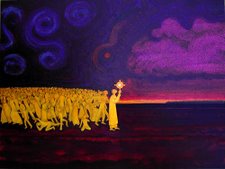
[I Still do not have any time to comment, but wanted to post this here for future reference, as this book had a profound effect on me a few years ago]
"...We are all aware of the popularity of witchcraft, magic, astrology and the "New Age" movement. The cults and new religions are growing in number and strength every year: in contrast, the Catholic Church is often represented as a fossil, its life extinguished by centuries of dogmatism. True Christianity, says the New Age, has been lost, or retreated underground where only an elite few can find it. Meditations on the Tarot answers these accusations. It claims that Christianity has not been lost at all, but has been preserved precisely by those institutions and dogmas that, to the New Agers, appear opposed to the life of the Spirit. The book was written by a remarkable convert, an experienced occultist who finally discovered "that there are guardian angels; that there are saints who participate actively in our lives; that the Blessed Virgin is real... that the sacraments are effective... that prayer is a powerful means of charity; that the ecclesiastical hierarchy reflects the celestial hierarchical order... that, lastly, the Master himself--although he loves everyone, Christians of all confession as well as all non-Christians--abides with his Church, since he is always present there, since he visits the faithful there and instructs his disciples there."
By means of 22 meditations, in the form of "letters to an unknown friend", the anonymous author attempts to assimilate his vast store of "esoteric" knowledge, gleaned from years of spiritual training in the more serious New Age groups, within the orthodox Catholic vision of faith. The Tarot cards are used, not for divination, but as symbolic encapsulations of the wisdom he has leant. "The High priestess warns us of the danger of Gnosticism in teaching the discipline of true gnosis. The Empress evokes the dangers of mediumship and magic in revealing to us the mysteries of scared magic. The Emperor warns us of the will-to-power and teaches us the power of the Cross."
Hans Urs von Balthasar has compared the author to Charles Williams, Hildegard of Bingen and even St Bonaventure, praising (with certain qualifications) the book's "superabundance of genuine, fruitful insights". An example of such an insight might be the distinction it draws between three forms of mystical experience: union with Nature, with the transcendental human Self and with God. The first is pantheism; the second lies at the heart of the Eastern religions, and leads to metaphysical distortions when Westerners take the Self to be identical with God. The third is the goal of Christianity, and is inevitably dualistic because it involves the union in love between two distinct beings. Characteristic of this third kind of mystical experience is the "gift of tears", whereas the "advanced pupil of yoga or Vedanta will forever have dry eyes".
At its orthodox core, the Hermetic wisdom boils down to the doctrine of analogy: "As above, so below." By exploring the implications of this symbolic correspondence between different levels of reality, the author opens a dimension of depth on the Scriptures and dogmas of the Church. Take the so-called Law of Reward: "Renunciation of what is desired below sets in motion forces of realization above." This leads the author into an analysis of the three sacred vows--poverty, chastity and obedience--as the basis, not just of monastic life, but of all spiritual realization. The three temptations of Christ in the wilderness are directed at the three vows, the angels who came to minister to him after his triple victory are the "response from above", bringing him a threefold reward.
The three vows are also related to the five wounds, the Stigmata: "obedience rivets the will-to-greatness of the heart", "poverty holds fast the desire to take and the desire to keep of the right hand and the left hand", while "chastity pins down the desires of the 'Nimrodic hunter'." Christ's triple victory flowers into the seven sacraments, each corresponding to one of the "seven archetypal miracles" and one of the seven "I am" sayings in the Gospel of John. Exposing in this way hidden connections that link seemingly unrelated events in the Bible, Meditations on the Tarot aims to attune us with the breath of the Holy Spirit, who inspires and vivifies Scripture.
Meditations on the Tarot has flaws: the influence of anthroposophy is still too evident, for example, in the discussion of reincarnation. But potentially important for the future of the New Age movement is its breakthrough realization that, in Christianity, the esoteric and the exoteric cannot be separated, because "the spiritual world is essentially moral"... CONTINUE READING



No comments:
Post a Comment